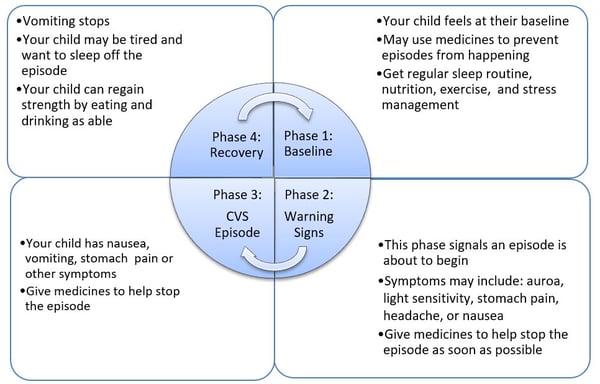What is cyclic vomiting syndrome?
Cyclic vomiting syndrome (CVS) is a condition that involves repeated vomiting episodes. The episodes can be predictable since they often start at the same time of day, last the same length of time. They have the same severity of symptoms. There are 4 phases of CVS (see the picture below.) CVS episodes can range in severity. They can last from several hours to a few days. It affects people of any age. It usually starts in children 3 to 7 years old.
What causes cyclic vomiting syndrome?
There are no known causes for CVS. Researchers believe the problem starts in the brain. The body’s vomiting center is in the brain. Studies have shown that CVS is often linked to a family history of migraine headaches. Many children may have fewer vomiting episodes at some point. They may outgrow CVS. CVS can lead to abdominal migraines or migraine headaches later in life.
What are the triggers?
The most common triggers are:
- Stress
- Positive: Holidays, school events, or vacations
- Negative: School assignments and tests
- Viral infections, allergies or sinus problems
- Excess sugar or junk food, dietary Monosodium Glutamate (MSG), aged cheese, chocolate, nitrites, or caffeine
- Poor sleep or changes in sleep pattern
What are the symptoms?
- Upset stomach and vomiting
- Belly pain
- Heaving or gagging
- Loss of hunger
- Loose or hard stool
- Headache or light sensitivity
- Feeling tired or dizzy
- Low grade fever
What tests might need to be done?
CVS is diagnosed by your child’s symptom pattern. Based your child’s symptoms, their health care provider may order other tests to rule out other conditions.
How is it treated?
There is no cure for CVS. There are ways to help prevent or reduce your child’s symptoms. Things you can do may include:
- Medicine to prevent future episodes
- Medicines to stop the episode after it starts
- Lifestyle changes
- Drink plenty of fluid every day.
- Limit or do not eat junk food. This includes foods with Monosodium Glutamate (MSG) or foods like aged cheese, chocolate, nitrites, or caffeine.
- Exercise for 30 minutes a day. Do this at least 5 times a week.
- Use relaxation strategies.
- Get good sleep. Not getting enough sleep makes symptoms much worse.
When to seek help?
Talk to your child’s health care provider if:
- Their CVS episode is worse than a typical episode
- Symptoms are not improving.




